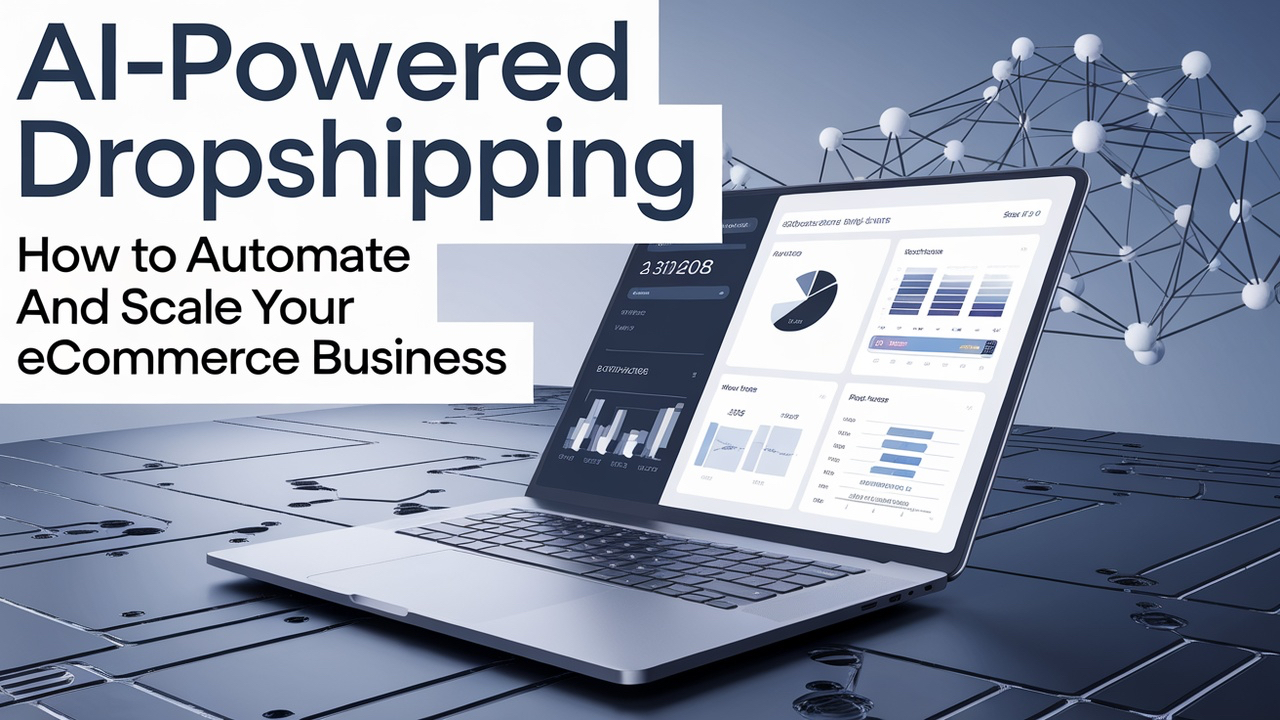AI-Powered Dropshipping: How to Automate and Scale Your E-commerce Business
87 Views · In E-commerce & Dropshipping · View CommentsIntroduction
In the bustling world of e-commerce, dropshipping has emerged as a popular business model for entrepreneurs seeking to enter the market with minimal upfront investment. However, managing a dropshipping store can be labor-intensive, requiring constant attention to inventory, marketing, customer service, and more. This is where AI comes into play, revolutionizing how dropshipping businesses operate through automation and scalability. In this comprehensive guide, we delve into how AI for eCommerce can transform your dropshipping business, making it more efficient, cost-effective, and scalable.
Understanding AI in Dropshipping
What is AI Dropshipping Automation?
AI dropshipping automation involves using artificial intelligence technologies to streamline and enhance various aspects of your dropshipping business. AI algorithms can handle tasks from product selection based on market trends, customer behavior analysis, to automated customer service through chatbots.
Key Areas Where AI Can Make an Impact:
Product Selection and Sourcing: AI can analyze trending products, consumer preferences, and competitor data to suggest which items to sell.
Inventory Management: With AI, you can predict demand, automate stock replenishment, and avoid overstocking or stockouts.
Customer Service: AI-driven chatbots can handle inquiries, manage complaints, and even upsell products, operating 24/7.
Marketing and SEO: AI tools can optimize your marketing efforts by personalizing ads, automating SEO tasks, and analyzing campaign performance.
Order Processing: From order confirmation to tracking updates, AI can automate the entire customer journey.
How to Implement AI in Your Dropshipping Business
1. Market Analysis with AI
Trend Forecasting:
Utilize AI tools like Google Trends, or specialized AI platforms like Trend Hunter, to identify what products are gaining traction. Learn more about trend analysis on our market analysis page.
Consumer Behavior:
AI can analyze vast amounts of data from social media, search queries, and purchase histories to understand what your target audience wants.
2. Automating Product Selection
AI Tools for Product Research:
Platforms like Oberlo or Spocket now incorporate AI to suggest products based on real-time sales data and market saturation. Check out our guide on product research tools.
Dynamic Pricing:
AI can adjust prices dynamically based on demand, competition, and inventory levels to maximize profit margins.
3. Enhancing Customer Experience
Chatbots:
Implement AI chatbots on your site or social media. Tools like Tidio or Drift can offer instant responses, manage returns, or provide recommendations based on previous interactions.
Personalized Shopping:
Use AI to curate product suggestions, offering a personalized shopping experience which can increase customer satisfaction and sales.
4. Streamlining Operations
Order Fulfillment:
Partner with AI-enhanced fulfillment centers like those from Shopify or Amazon, which use AI for quicker and more accurate order processing.
Inventory Management:
AI can predict when to reorder products, minimizing waste and ensuring availability, tools like Optoro can be pivotal here.
5. Marketing Automation
SEO Automation:
Tools like MarketMuse or BrightEdge use AI to optimize your content dynamically for better search engine rankings. Explore our SEO strategies for more insights.
Email Marketing:
AI can segment your audience and personalize email campaigns, ensuring higher open rates and engagement. Platforms like Mailchimp leverage AI for this.
Scaling Your Business with AI
Scalability Through Data-Driven Insights
Performance Analytics:
AI continuously learns from your business data, offering insights that can drive strategic decisions on scaling operations or expanding product lines.
Predictive Analytics:
Use AI to forecast future sales trends, helping you plan inventory and marketing strategies well in advance.
Leveraging AI for Competitive Advantage
Competitive Analysis:
AI tools can monitor your competitors’ strategies, pricing, and customer reviews to give you an edge in the market.
Niche Market Identification:
AI can help identify untapped niches or micro-trends, allowing you to target markets with less competition.
Challenges and Considerations
Investment: Implementing AI requires an upfront investment in software or services, which needs to be weighed against potential ROI.
Data Privacy: With AI, handling customer data responsibly is crucial. Ensure compliance with regulations like GDPR or CCPA.
Learning Curve: There might be a learning curve associated with integrating AI tools into your existing systems.
Future Trends in AI for Dropshipping
Voice Commerce: As voice assistants become more sophisticated, selling through voice commands could become more prevalent.
AI in Supply Chain: Enhanced AI applications in logistics could further reduce delivery times and costs.
Hyper-Personalization: AI will continue to personalize not just marketing but the entire customer journey, from product discovery to post-purchase support.
Conclusion
AI-powered dropshipping isn't just a trend; it's becoming a necessity for businesses looking to stay competitive in the fast-paced e-commerce landscape. By automating routine tasks, providing deeper insights into consumer behavior, and enhancing customer interaction, AI can significantly elevate the efficiency and scalability of your dropshipping business. As you consider integrating AI, think about how each aspect – from product selection to customer service – can be optimized. With the right approach, AI could be the key to unlocking your business's full potential, driving growth, and ensuring sustainability in an ever-evolving market.
Call to Action
Are you ready to leverage AI in your dropshipping venture? Start by evaluating your current workflows to identify areas where AI could make the most significant impact. Experiment with AI tools, perhaps starting with customer service automation or market analysis, and scale up as you see benefits. Remember, the future of e-commerce is not just about selling products but creating an intelligent, seamless shopping experience. Embrace AI, and watch your business transform. For more resources, visit EarnQuestHub.

Add a comment...
Comments